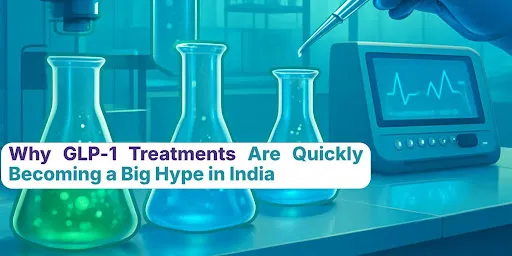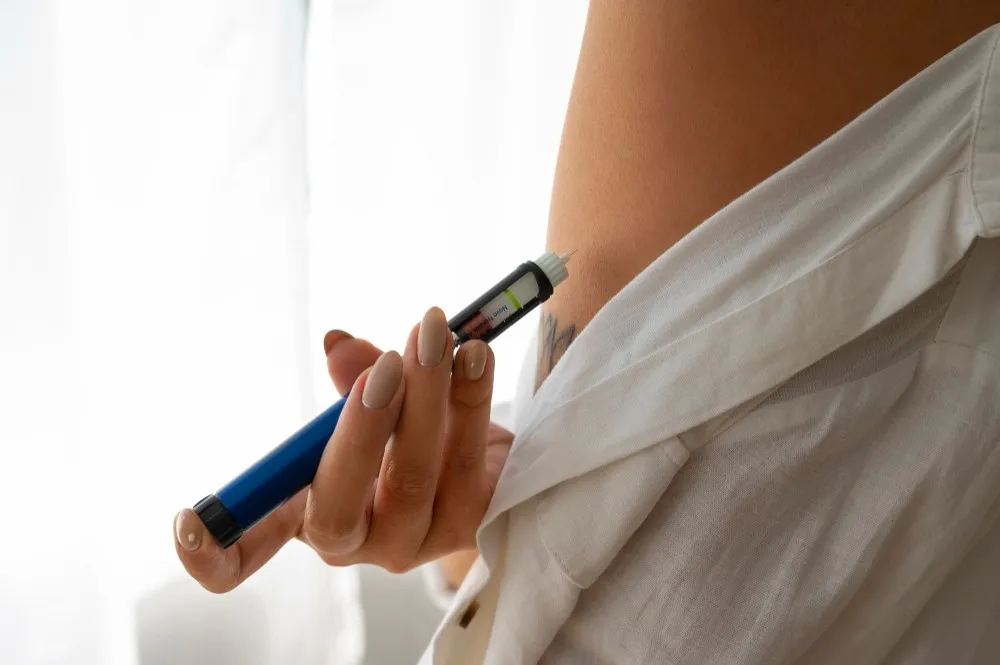1. What is Diabetes?
Diabetes is a metabolic disease in which the blood sugar or blood glucose level increases above the normal levels. The glucose or sugar comes from the food that we intake. Our body has a hormone called insulin that is produced by the pancreas. It helps the glucose to enter our cells and produces energy.
Patients get diabetes when either the cells do not respond to insulin or when the pancreas stop producing the required amount of insulin. Due to this, the glucose stays in your blood and over time the level of glucose in your blood increases. It can cause serious problems like damage to nerves, eyes and kidney, stroke, heart diseases, and sometimes even gangrene of limbs.
2. Types of diabetes?
Diabetes is of three types:
a. Type 1 Diabetes Mellitus - It was formerly known as juvenile diabetes or insulin-dependent diabetes. This type of diabetes occurs when the body fails to create the necessary amount of insulin. This usually occurs in people under the age of 20 - a child or a young adult. It typically stays for a lifetime and cannot be completely cured. People who suffer from this diabetes usually get treated by getting insulin.
b. Type 2 Diabetes Mellitus - It was previously known as adult-onset diabetes or noninsulin-dependent diabetes mellitus (NIDDM). This type of diabetes usually occurs when the cells don't respond to insulin and the glucose cannot enter the cells. This usually occurs in people who are overweight, especially when they get older. It is considered as a disease caused by wrong lifestyle, not doing exercise and being overweight.
c. Gestational diabetes - It is also known as gestational diabetes mellitus. This type of diabetes usually occurs in pregnant women. It typically occurs in the second trimester of pregnancy and approximately 4% of the total pregnant women develop this form of diabetes. But, it disappears after the birth of the baby; although the mother has a high risk of developing Type 2 DM in the future.
3. Symptoms of Diabetes?
There are several symptoms and signs of diabetes, but sometimes you might not get any sign. These symptoms are:
- Tiredness
- Numbness in feet or hand or a tingling sensation - The high level of sugar in your system damages your nerves. This results in a tingling sensation or numbness in your hand or feet.
- Recurrent infection - People having diabetes have a high chance of getting recurrent infection. There is no explanation but it may be because the body's immunity is impaired.
- Headache
- Blurred vision
- Polydipsia and Polyuria - Polydipsia or excessive thirst and Polyuria or frequent urination is one of the most important symptoms of diabetes. Because of the excess glucose in the system, the kidney tries to filter out the extra sugar which leads to frequent urination. This in turn leads to excessive intake of water because of dehydration.
- Polyphagia (Increased hunger) - Since the calories are being flushed out by kidney by the way of frequent urination, then the food does not reach your cells. This results in increased hunger.
- Stomach pain
- Vomiting
- Tender, swollen gums
- Slow healing of wound
- Lack of concentration and interest
4. Complications of Diabetes?
Diabetes comes with a high range of serious complications. It is less seen in the patients who keep the sugar levels of the blood in control and more in the patients who don't. Some complications of diabetes are:
a. Cardiovascular disease - People suffering from diabetes have a high risk of getting several cardiovascular diseases like heart attack, coronary artery disease with chest pain (angina), narrowing of arteries (atherosclerosis), and stroke.
b. Neuropathy (Nerve damage) - The excess glucose or sugar level in the blood damages the neural tissue. This results in numbness, tingling, and pain or burn in your limbs. If the digestion nerves are damaged, then it might result in vomiting, constipation, nausea, or diarrhoea. Men can also suffer from erectile dysfunction.
c. Retinopathy (Eye damage) - The blood vessels of your retina can also get damaged due to high sugar level in your blood. This can potentially lead to blindness. It can also result in other serious eye conditions like glaucoma and cataracts.
d. Nephropathy (Kidney Damage) - Because of excess filtering of waste, the kidney gets damaged. It can result in kidney stones, irreversible end-stage kidney disease or kidney failure.
e. Skin conditions - People having diabetes are prone to getting skin problems like fungal and bacterial infections.
f. Foot damage- Because of damage in the arteries of feet, the circulation gets affected that further increases the risk of foot problems. If you get a cut in the leg or a blister, it does not heal easily. Uncontrolled diabetes can eventually lead to full occlusion of the blood vessels leading to gangrene. Limb ay need amputation in this case.
g. Alzheimer's disease - People suffering from Type 2 diabetes have a high risk of getting the Alzheimer's disease, especially if you don't keep your blood sugar level under control.
h. Hearing impairment - It is common in people suffering from diabetes.
i. Pregnancy complications - If a woman suffers from gestational diabetes during her pregnancy, then she has a chance of getting some complications.
- The complications that can occur in your baby are - excess growth (can lead to obstructed labour and birth injuries), low blood sugar, chances of getting type 2 diabetes in future, and death.
- The complications that can occur in a mother are - preeclampsia, eclampsia, polyhydromnios, prolonged labour, subsequent gestational diabetes, and chances of getting type 2 diabetes in future.
5. What is prediabetes?
Prediabetes is the phase before getting diabetes. Most people get it before having diabetes. In this, people have high blood glucose level that is not in the diabetes range but is almost near the border line. It is like a wakeup call and people having prediabetes should start taking care of themselves and develop a healthy lifestyle, so that they don't get Type 2 diabetes in the future.
6. How to determine whether you have prediabetes, diabetes or neither?
There are three different tests that a person can take to determine whether he/she has diabetes, prediabetes, or neither. They are:
a. A1C Test - In this test, if you get below 5.7% then it means that you are normal. If you get between 5.7% and 6.4%, it means that you have prediabetes. And if you get above 6.5%, it means that you have diabetes. b. Fasting Plasma Glucose (FPG) Test - If you get the glucose concentration between 110 mg/dl and 125 mg/dl, it means that you have prediabetes. And if you get above 126 mg/dl, it means that you have diabetes. c. Oral Glucose Tolerance Test (OGTT) - In this an oral loadof glucose is given and hourly measurement of blood glucose levels are taken.
7. Diet for diabetes?
People having diabetes should eat healthy food. It is vital for them to eat right and to keep their blood sugar under control. Oatmeal is good for controlling your blood sugar level, but you should not eat the sweetened oats. More of fibre should be taken in diet. Food like white bread, white rice, and potatoes should be avoided as it instantly gets converted to blood sugar. Instead of these, you can have brown bread, brown rice, sweet potatoes, and other high fibre foods.
8. Risk for diabetes?
There are several risk factors for developing diabetes. They are:
- Being overweight
- Having a family history of diabetes
- Any disease or injury in the pancreas
- Due to less physical activity
- If you are from African ethnicity, Mongolian ethnicity or Caucasian.
- If you had gestational diabetes
9. Treatment of diabetes?
Diabetes can typically not be cured fully. But you can keep your blood sugar levels under control. To manage diabetes, you can do the following:
- Have a healthy diet that includes fruits, vegetables, and whole grains.
- Exercise regularly
- Monitor your blood sugar level on a daily basis
- Take your medication for diabetes or insulin therapy as recommended by your doctor.
- If your BMI is high, weight reduction should be a priority
List of the best diabetes doctor in India
Delhi NCR | Mumbai Region | Kolkata | Hyderabad | Chennai | All India

Reviewed by







